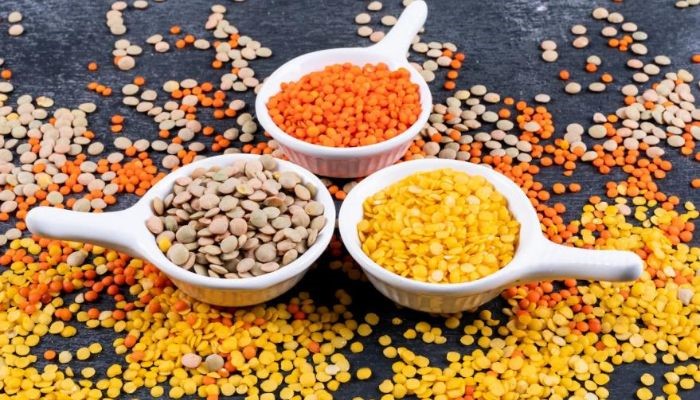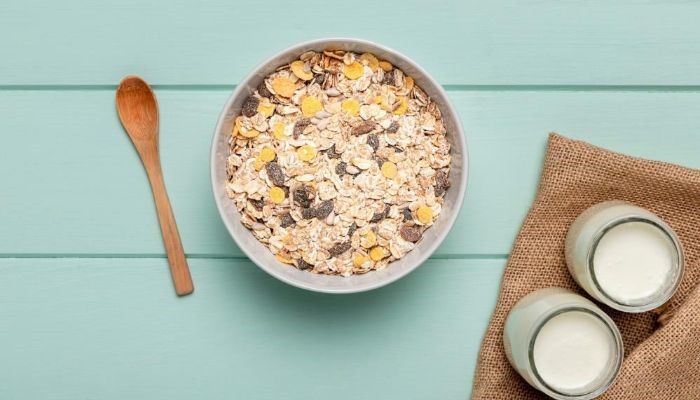Table of Contents
It is common knowledge that meat, chicken and eggs are abundant sources of protein, one of the three macronutrients that are essential building blocks of the body. But that does not necessarily mean that a strictly vegetarian diet will be grossly protein-deficient. A well-planned and balanced vegetarian diet can contain enough protein and all other essential nutrients.
Our body needs 0.36 grams of protein per pound of body weight daily. If you’re a vegetarian and worried that you’re not getting the required amount, this blog is for you. Here are some excellent tips to incorporate vegetarian protein sources into your diet.
1) Add Lentils to Your Plate
 Lentils or dal is a very common ingredient in Indian cuisine and a great source of protein. You can have your dal cooked the usual way and have it with chapati or rice, or innovate and add it to your salad or yoghurt bowl. Another excellent idea is to make a lentil-based dosa for breakfast.
Lentils or dal is a very common ingredient in Indian cuisine and a great source of protein. You can have your dal cooked the usual way and have it with chapati or rice, or innovate and add it to your salad or yoghurt bowl. Another excellent idea is to make a lentil-based dosa for breakfast.
Protein content: 9 grams per 100 grams of cooked lentils.
2) Yoghurt For Breakfast

Yoghurt, or curd, as it’s more commonly known in India, is another good source of protein. Yoghurt also contains probiotics which are great for gut health and promote digestion. Yoghurt topped with various nuts, seeds and fruits can be a delicious breakfast to start your day.
Protein content: 10 grams per 100 grams of yoghurt.
3) Go nuts for nuts!

Nuts like almonds, hazelnuts, peanuts and cashew nuts are some of the best sources of proteins out there. They also contain healthy unsaturated fats and many other nutrients like iron, calcium, magnesium, etc. Eat them whole, add them to your yoghurt bowl or just grind them and make a delicious nut butter.
Protein content: 20 grams per 100 grams of mixed nuts
4) Chia Seed Smoothies

Chia seeds have grown in popularity among the health-conscious, thanks to the abundance of protein present in them. Chia seeds also contain high levels of iron, calcium, magnesium and selenium. Chia seeds with yoghurt or in smoothies can nicely round out your veg protein diet.
Protein content: 17 grams per 100 grams of chia seeds.
5) Have Oats and Oatmeal

A high protein vegetarian diet may be incomplete without oats. They’re readily available and one of the easiest ways to add protein to your diet. You can prepare oatmeal by adding hot milk to oats or jazz it up by making oatmeal cookies, breakfast bars and oat flour pancakes.
Protein content: 12 grams per 100 grams of oats
6) Eat Protein-Rich Vegetables

Who says veggies do not contain protein? Although present in much smaller amounts, vegetables like broccoli, asparagus, spinach, and even potatoes can be great additions to your vegetarian protein diet.
Protein content: Typically 3-5 grams per 100 grams of cooked vegetables.
7) Include Green Peas in Your Dishes

Green peas are excellent sources of proteins and can be a convenient addition to any meal. They’re so versatile you can cook your veggies with them, make vegetable cutlets, healthy burgers, etc. They’re also rich in iron, magnesium, vitamin A, vitamin C and fibre.
Protein content: 5 grams per 100 grams of cooked green peas.
8) Say Yes to Beans

Kidney beans and chickpeas are excellent protein rich foods for vegetarians. They also contain complex carbohydrates, iron, folate, phosphorus and fibre. Roasted chickpeas as a daytime snack and kidney beans (rajma) cooked Indian style can be an excellent way to increase your protein intake.
Protein content: 9 grams per 100 grams of cooked beans
9) Try a Quinoa Salad
Quinoa is yet another food that can help you get your daily protein requirement. It is also a complete protein. Quinoa can be cooked like any other grain and is a great side dish. One of the best ways to consume Quinoa is to prepare a delicious Quinoa salad with nuts, seeds and greens.
Protein content: 5 grams per 100 grams of cooked quinoa
10) Soy Milk Shakes

Soy milk is not just a great source of protein, but also contains calcium, vitamin D and B12. If you’re looking for an alternative to dairy milk, then soy milk is an excellent option. You can use soy milk to make smoothies and milkshakes, add it to your baked recipes, coffee and tea.
Protein content: 3.3 grams per 100 grams
Although there are many vegetarian protein sources, some may contain more protein than others, and it can be tricky to choose the right ones. If you’re looking for an experienced nutritionist to ensure you get adequate protein, then enrol for a FITPASS membership today. With our dedicated FITFEAST plans, you get a dedicated nutritionist who can help you with the most effective protein-rich diet.
What is the best source of protein?
The best source of protein is subjective and depends on individual dietary needs and preferences. Some of the highest protein sources include animal products like chicken, fish, eggs, dairy and red meat, and plant-based options like beans, lentils, tofu, nuts, and quinoa. It's best to have a variety of protein sources for a balanced diet.
What are some high-protein vegetarian foods?
Some high-protein vegetarian foods include beans, lentils, tofu, tempeh, quinoa, almonds, peas, peanut butter, Greek yogurt, and dairy products. These foods offer substantial amounts of protein per serving, making them ideal for individuals following a vegetarian or plant-based diet.
How much protein should a vegetarian aim to consume daily?
The recommended daily intake of protein for adult vegetarians is 0.8 grams per kilogram of body weight, or about 46 grams for the average sedentary woman and 56 grams for the average sedentary man. However, individual protein needs may vary based on factors such as age, gender, and physical activity level.



